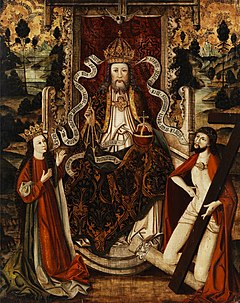
Back ملكوت الله (مسيحية) Arabic Regne de Déu (cristianisme) Catalan Reino de Dios (cristianismo) Spanish پادشاهی خدا (مسیحیت) Persian Kerajaan Allah ID 하나님 나라 (기독교) Korean Mbretëria e Zotit Albanian Ufalme wa Mungu Swahili Tanrı'nın Krallığı Turkish

The Kingdom of God (and its related form the Kingdom of Heaven in the Gospel of Matthew) is one of the key elements of the teachings of Jesus in the New Testament.[1][2] Drawing on Old Testament teachings, the Christian characterization of the relationship between God and humanity inherently involves the notion of the Kingship of God.[3][4] The Old Testament refers to "God the Judge of all" and the notion that all humans will eventually "be judged" is an essential element of Christian teachings.[5] Building on a number of New Testament passages, the Nicene Creed indicates that the task of judgment is assigned to Jesus.[5][6]
The New Testament is written against the backdrop of Second Temple Judaism. The view of the kingdom developed during that time included the restoration of Israel to a Davidic Kingdom and the intervention of God in history via the Danielic Son of Man. The coming of the kingdom of God involved God finally taking back the reins of history, which he had allowed to slacken as pagan Empires had ruled the nations.[citation needed] Most Jewish sources imagine a restoration of Israel and either a destruction of the nations or a gathering of the nations to obedience to the One True God. Jesus stands firmly in this tradition.[citation needed] His association of his own person and ministry with the "coming of the kingdom" indicates that he perceives that God's great intervention in history has arrived and that he is the agent of that intervention. However, in the Parable of the Mustard Seed,[7] Jesus seems to indicate that his own view on how the kingdom of God arrives differs from the Jewish traditions of his time. It is commonly believed that this multiple-attested parable suggests that the growth of the kingdom of God is characterized by a gradual process rather than an event, and that it starts small like a seed and gradually grows into a large firmly rooted tree.[8] His suffering and death, however, seem to cast doubt upon this (how could God's appointed king be killed?) but his resurrection affirms his claim with the ultimate proof of only God having resurrection power over death. The claim includes his exaltation to the right hand of God and establishes him as "king". Jesus' predictions of his return make it clear that God's kingdom is not yet fully realized according to inaugurated eschatology but in the meantime the good news that forgiveness of sins is available through his name is to be proclaimed to the nations. Thus the mission of the Church begins and fills the time between the initial coming of the Kingdom, and its ultimate consummation with the Final Judgment.
Christian interpretations or usage of the term "kingdom of God[9]" regularly make use of this historical framework and are often consistent with the Jewish hope of a Messiah, the person, and ministry of Jesus Christ, his death and resurrection, his return, and the rise of the Church in history. A question characteristic to the central theme of most interpretations is whether the "kingdom of God" has been instituted because of the appearance of Jesus Christ or whether it is yet to be instituted; whether this kingdom is present, future or is omnipresent simultaneously in both the present and future existence.
The term "kingdom of God" has been used to mean Christian lifestyle, a method of world evangelization, the rediscovery of charismatic gifts and many other things. Others relate it not to our present or future earthly situation but to the world to come. The interpretation of the phrase is often based on the theological leanings of the scholar-interpreter.[10] A number of theological interpretations of the term the Kingdom of God have thus appeared in its eschatological context, e.g., apocalyptic, realized or Inaugurated eschatologies, yet no consensus has emerged among scholars.[11][12]
- ^ Jesus: An Historian's Review of the Gospels by Michael Grant (1977). New York: Charles Scribner's Sons ISBN 0684148897 pp. 5-191 [I, "Nothing Matters but the Kingdom of God," ch. 1-10]
- ^ The Gospel of Matthew by R.T. France (2007) ISBN 080282501X pp. 101–103
- ^ Cite error: The named reference
Mercer490was invoked but never defined (see the help page). - ^ Cite error: The named reference
Image478was invoked but never defined (see the help page). - ^ a b Introducing Christian Doctrine (2nd Edition) by Millard J. Erickson (2001) ISBN 0801022509 pp. 391–392
- ^ Systematic Theology Vol 2 by Wolfhart Pannenberg (2004) ISBN 0567084663 pp. 390–391
- ^ Parable of the Mustard Seed"Parable of the Mustard Seed", Wikipedia, 2020-09-07, retrieved 2020-09-08
- ^ Marshall, I. Howard (1978-11-14). The Gospel of Luke. Wm. B. Eerdmans Publishing. ISBN 978-0-8028-3512-3.
- ^ "Kingdom of God". Lord Message.
- ^ Cite error: The named reference
FranceK1was invoked but never defined (see the help page). - ^ Cite error: The named reference
familiar77was invoked but never defined (see the help page). - ^ Cite error: The named reference
Chil255was invoked but never defined (see the help page).
© MMXXIII Rich X Search. We shall prevail. All rights reserved. Rich X Search